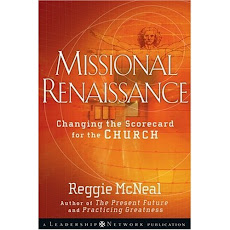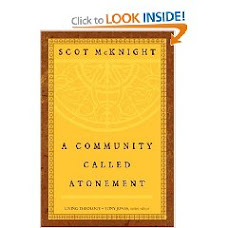 I had another great lunch conversation with a good friend, Rob, last week. We talked for an hour about finding common ground on “emerging Christianity,” and the continuing discussion from our August meeting on “How we do church”.
I had another great lunch conversation with a good friend, Rob, last week. We talked for an hour about finding common ground on “emerging Christianity,” and the continuing discussion from our August meeting on “How we do church”.From my perspective (and I won’t speak for Rob but I believe this was true of his) we found we agree on the centrality of Christ, but have different perspectives…different lenses... through which we see experiences, expressions and framing stories of the Gospel.
Take church authority for instance. First, we agreed on the need for Christians to look to authoritative sources in their life’s journey: Scripture, pastors, church tradition, the Holy Spirit, that “still small voice.” But we clarified the distinction between our sources being “authoritative,” meaning we yield respect because of the inherent qualities we trust and admire in the authority, versus “authoritarian” power which demands and coerces obedience regardless of the quality of leadership or the respect of those yielding.
Then we also discussed the “relationships” of church authority in our lives (Here I also include some references that another good friend, Robin M., sent me after the lunch). “Institutional churches,” according to author Frank Viola http://www.housechurchresource.org/ are characterized by a top-down hierarchical organization. For some, there may be a fear that unless this type of top-down control is in place, chaos ensues. For me, having no authority allows us to stray, but relying too much on hierarchical authority dismisses the presence and power of the Holy Spirit, which is here to teach us, and it can dismiss our uniqueness and freedom in Christ, along with many other legitimate ways that God speaks to each one of us. Viola proposes an alternative he calls “organic church.” He says, “By ‘organic church,’ I mean a non-traditional church that is born out of spiritual life instead of constructed by human institutions and held together by religious programs. Organic church life is a grass roots experience that is marked by face-to-face community, every-member functioning, open-participatory meetings (opposed to pastor-to-pew services), non-hierarchical leadership, and the centrality and supremacy of Jesus Christ as the functional Leader and Head of the gathering.” Viola goes on to use different types of plants as an analogy for different types of organic churches.
I compare organic church to a grapevine. Jesus said, “I am the vine, and you are the branches.” Grapevines, as we know, are disorganized tangles of trunks and leaves and stems and grapes. They are not straight, tall trees with neat radial branches. My “church authority” might include all of the sources mentioned above, and I might add to that, my friend who the Lord led to start a men’s fellowship in his home. At another time, it might include a different friend who recently graduated from seminary and has demonstrated his pastoral care for me… and then he might yield authority to me in other areas where I have matured more. At other times, my church authority might extend to trusted authors or bloggers who have sewn into my life. I've quoted or gleaned from many of these different sources in this post. So here, church authority is not “linear” but “distributed.” Much like the grapevine.
Speaking of plants, this also makes me wonder about fig trees and the incident in Mark 11:12-14 and other Gospels where Jesus curses the barren fig tree and it withers. Some have said this could symbolize the barrenness of the teachings and authority of the Temple priests due to their lack of true faith, and being cut off from the true vine... Jesus.
Grapevine relationships then become not just vertical (me and God) or even additionally horizontal (me and others in God’s house) but now includes personal wholeness and relationship with the world and all others around me. Or, as Scot McKnight puts it in his book A Community Called Atonement, redemption goes in four directions, “…resolving sin and bringing humans back home in their relationship with God, with self, with others and with the world.”
Rob is faithful to remind me that “there is nothing new under the sun” (Ecclesiastes 1:9) when he hears certain “emerging church” expressions about things like "organic church," "simple church," "house church," etc. (I'm reminded here of David Bowie's line, "...same old thing in brand new drag"). But while God is steadfast in his love, there are again new perceptions, lenses, experiences and framing stories that I believe help us to grow closer to God, and keep reforming, in each generation. There were even “new covenants” and “new commands” throughout the thousands of years of the Bible. And there will be “a new heavens and a new earth…and a new Jerusalem coming down out of heaven.” Ultimately, if we simply dismiss new conventions, we discount the value of any religious writing, art, thought, or practice after the last words in Revelation (or even the four Gospels).
What then do we do with church tradition, including its modern “institutional” paradigms? The fear of change on the one hand is of, “throwing the baby (Jesus in this case) out with the bath water” vs. pointing to the baby (the church, the “body of Christ” in this case) and saying, “the baby’s sick, we need to change the bath water and take the baby to the hospital for diagnosis and treatment." Baptist author Reggie McNeal says in his book Present Future, “The current church culture in North America is on life support. The plug will be pulled either when the money runs out or when the remaining three-fourths of a generation who are institutional loyalists die-off, or both….The church established by Jesus will survive until he returns…[but] the church culture in North America is a vestige of the original movement, an institutional expression of religion that is in part a civil religion and in part a club where religious people can hang out with other people whose politics, worldview and lifestyle match theirs.” Powerful words these (and this is but a sample from McNeal) but words that are resonating with an increasing number of Christians and that is probably one reason you are reading this post.
But what of the many good church traditions through the past two millennia? Want to drive a Catholic-basher crazy? Tell them there were Christians, real saved going-to-heaven Christians, around a thousand years before the Reformation began. And that they were Roman Catholic (and Eastern Orthodox). The church has always had rich and wonderful spiritual meat for its members. And still does. But which denominational "doctrine" do we follow?
In Brian McLaren’s A Generous Orthodoxy, he extols some of the best of nearly every major Christian movement since the church began. McLaren “celebrates orthodox doctrine-in-practice,” and “while not burying doctrinal distinctives, puts them in their marginal place.” This has been my approach, and it has made it impossible for me to rationally choose to adhere to one denomination over all others. It used to be that “full Gospel” referred to the charismatic movement. Perhaps now this term could apply to a non-denominational, emerging church movement that embraces every expression, perception, lens, experience and framing story of Biblical narrative - focused on the life, death and resurrection of Christ. Balance again is the key. In some ways we can minister to, or with, institutional churches. In some ways we must work around them, as the Lord leads us, to…the “full Gospel," and to the true vine.
Deriving the benefits of church authority in our lives, using a distributed authority model, naturally requires conversation. Such conversation can often be hampered by strict denominational constraints, and when “church” is limited to a lecture format (pastor-to-pew services). Again, what McKnight says about atonement is useful here, “Our grasp of atonement is partial; the God we are grasping for is complete and whole. In God there is absolute truth; in our articulations there is always something lacking, something partial, and something still yearning for yet more. A proper confidence in God who atones reminds us of this and keeps us humble – and in conversation as we work this atonement thing out in each generation.”
Steve













5 comments:
Steve, very interesting post (and you did convey the essence of our lunch conversation). You said a lot in that post, and I haven't thought this all the way through yet (so I’m bound to misstate or oversimplify some of what you wrote), but I just wanted to throw this out for thought. You wrote, "My 'church authority' might include all of the sources mentioned above [scripture, tradition, pastors, the Holy Spirit] and I might add to that, my friend[s]... At other times, my church authority might extend to trusted authors or bloggers who have sewn into my life."
This sounds like a very inclusive, broad-minded way of thinking about the sources the Lord may use to work in and through you. Sounds like. But couldn't it also be (and I'm not saying it is, to you) just another way of saying you accept no authority accept the one(s) you happen to find legitimate or even just attractive at any given time in your life? That may seem like an extreme (and exaggerated) statement, but think about all the church-hoppers you and I have both known (and may have been) in our lives. Or the non-denominational churches that answer to no authority but their own and are (rightly, I think) criticized as being cult-like, or just plain cults. I find your message attractive in the abstract, but troubling as I think of the concrete applications and ramifications. We may well be like a grapevine in the eyes of God, even when we're trying our best to hold on to sound teaching, doctrine, and tradition, and to be a faithful, unified church under one Head, Christ. But does that mean we should aspire to disorganization? Think how that model would affect the thinking (about authority, doctrine, tradition -which Paul commended one congregation for holding to) of a new believer. To look at it from a practical perspective, would you want to try to do your job under such a structure? Remember the scene from Office Space, "You know how many bosses I've got, Bob? Eight. Eight! That means when I screw up, I've gotta hear about it from eight different people!" (I know that’s not what you meant; merely adding numerically to the authorities God has given. But it could well be taken that way by people who haven’t walked with the Lord as long –and, I would add, faithfully– as you.) But, I’m more concerned it could be used as a license to not submit to any authority (apart from our always incomplete and often just plain wrong thoughts about God) one doesn’t happen to like. I know there is always the possibility that we are told to reject someone or some structure’s authority over us (though I find it interesting that David didn’t reject Saul’s authority even when he was throwing spears at him, and didn’t even leave his service until he was actively trying to kill him), but I do think God’s call to do that is a LOT rarer than we already believe. Adopting your perspective of who is an authority would, I fear (I’m not afraid to admit my fear in this matter), make the word authority essentially meaningless.
You concluded, "Ultimately, if we simply dismiss new conventions, we discount the value of any religious writing, art, thought, or practice after the last words in Revelation (or even the four Gospels)." I just wanted to clarify (as I don't think it was clear in your post) that I am not merely dismissive of new conventions, but I am cautious about embracing them with abandon and little or no thought about their utility and consequences. I'd go one further, though, and say that had you used the word "old" rather than "new" (before "conventions") in the quote above, you'd have made my argument for me.
Rob: I think you are absolutely right that there are people who have not grown in their faith to the point where they don’t give in to the temptation to “shop around” for “…what their itching ears want to hear.” (II Timothy 4:3) And individual churches have been known to veer off in strange directions. That is again why staying in the vine is so vital. Without that, even whole denominations can also veer off into strange directions, and take their churches and congregations with them. One response I have to the individual “church shopper” dilemma is that if someone is interested in having no authority, then many large denominational churches are actually perfect places where some people can and do hide out for years. For them, the problem is not that they don’t have an “institutional” church authority, it’s that they don’t have close friends in the church (and here you can use the narrow definition of the group one meets with for an hour on Sunday, or the broader definition I have used) who they trust for advice. “Plans fail for lack of counsel, but with many advisers they succeed.” (Prov. 15:22) And they are not in such cases sincere in wanting to find the best direction they can for their lives. So, the answer does not have to be a single authority, but it has to be seeking authoritative counsel, with sincerity.
I’m also not saying all organization is bad. This could be taken as pretty “disorganized” though: “But the Counselor, the Holy Spirit, whom the Father will send in my name, will teach you all things and will remind you of everything I have said to you.” (John 14:26) What I am saying is this: At what point does the “organization” become the thing, versus the Holy Spirit being the thing? So, if the believer is staying part of the “true vine” (Christ) and does seek authoritative counsel in a variety of ways (as long as those authorities themselves stay in the vine), couldn’t that be a benefit in that they are less likely to fall prey to the errors of a single imperfect “authority?” Again, it’s a matter of perspective. Which is the greater danger? And where is found the greater benefit?
As I looked up references to authority I thought it was interesting that this exchange in Matthew 21 comes right after the withering of the fig tree: “Jesus entered the temple courts, and, while he was teaching, the chief priests and the elders of the people came to him. ‘By what authority are you doing these things?’ they asked. ‘And who gave you this authority?’ Jesus replied, ‘I will also ask you one question. If you answer me, I will tell you by what authority I am doing these things. John's baptism—where did it come from? Was it from heaven, or from men?’ They discussed it among themselves and said, ‘If we say, 'From heaven,' he will ask, ‘Then why didn't you believe him?' But if we say, 'From men'—we are afraid of the people, for they all hold that John was a prophet.’ So they answered Jesus, ‘We don't know.’ Then he said, ‘Neither will I tell you by what authority I am doing these things.’”
Good point regarding “old” versus “new” conventions. I probably should not have even used an oxymoronic phrase like “new conventions.” There is always the risk, and it happens all the time, that the something new does become a convention making it just as calcified as the old one is which it sought to change. A good example is the very evolution of many denominations. I join with those who hope the emerging church movement never becomes its own denomination. And I agree with you that every new thing should be checked out for both its usefulness and shortcomings, just like every old thing should. Thank you for helping me check all this out.
P.S. I can also think of at least one very important reason, albeit very cynical, that institutional churches would have to perpetuate the need for "single source" authority...it keeps the money flowing. I realize that is a sweeping generalization and certainly not true of many well intentioned organizations.
Hi Guys,
I am humbled by your thinking and intelligence. Thank you for sharing and allowing me to be a part of this healthy and necessary conversation.
I think the authority is God the Father, Son and the Holy Spirit and The Bible.
From these we can determine that his purposes for us are to:
1)Worship/Magnify the Lord
2)Fellowship/community build and live in his family.
3)Discipleship-become like Christ; Christ follower.
4)Ministry-lay down our life for our brothers.....servanthood....having the same attitude as Christ.
5)Mission: Evangelize, seeking and winning the lost.
This is where we need to keep our focus regardless of denomination, movement etc.
I think this is what we need to call people back to, this is what we need to challenge our own walk and remind ourselves of. This is God's purpose for us and should be the goal in any system, program, denomination, movement, etc.
Has the Church been effective in this regard? As a whole I would say not anywhere close to what we should, but there are many examples in many denominations that the obvious answer would be yes!
The sequel to “Pagan Christianity?” is out now. It’s called “Reimagining Church”. It picks up where “Pagan Christianity” left off and continues the conversation, going into organic church in much more detail. “Pagan Christianity” was never meant to be a stand alone book; it’s part one of the conversation. “Reimagining Church” is endorsed by Leonard Sweet, Shane Claiborne, Alan Hirsch, and many others. You can read a sample chapter at
http://www.ReimaginingChurch.org
It’s also available on Amazon.com. Frank is also blogging now at http://www.frankviola.wordpress.com. Also, have you seen the spoof video for "Pagan"? Very funny. Check it out at http://youtube.com/watch?v=hslswIal9u4.
Post a Comment